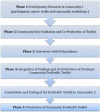Bridging Knowledge Systems: A Community-Participatory Approach to EcoHealth
- PMID: 34886163
- PMCID: PMC8657114
- DOI: 10.3390/ijerph182312437
Bridging Knowledge Systems: A Community-Participatory Approach to EcoHealth
Abstract
Earth's life-supporting ecosystems are integral to human and planetary health. Ecosystem services connect ecosystem functions to human wellbeing. The complex, multifaceted socio-ecological challenges of ecosystem decline necessitate a transdisciplinary approach, including the active and meaningful engagement and participation of local communities. Communities uniquely possess expert local knowledge, which, when integrated into policy development and community planning, has the potential to enhance and sustain ecosystem benefits for health and wellbeing. Community-informed mapping tools provide an opportunity for integrating science, policy, and public participation in data collection. However, there is a dearth of community-informed mapping tools demonstrating the interconnection of the ecological and social determinants of health at a place-based level. This paper presents a study that employs a community-based participatory research approach to mapping local knowledge systems on EcoHealth. The study seeks to develop a community mapping tool for shared dialogue and decision-making on EcoHealth between local communities and policymakers. The participatory research methods used to explore community awareness and knowledge regarding ecosystem services, health, and sustainability in the local area are described. The process of co-producing a Community EcoHealth Toolkit, based on the integration of different knowledge systems into local policy and planning, is discussed.
Keywords: Ireland; community; ecohealth; ecological determinants; mapping; participation.
Conflict of interest statement
The authors declare no conflict of interest.
Figures
References
-
- Intergovernmental Panel on Climate Change (IPCC) Contribution of Working Group I to the Fifth Assessment Report of the Intergovernmental Panel on Climate Change. Cambridge University Press; Cambridge, UK: 2013. [(accessed on 16 November 2021)]. Climate Change 2013: The Physical Science Basis–Summary for Policy Makers; p. 28. Available online: http://www.climatechange2013.org/report/
-
- Hancock T., Spady D.W., Soskoine C.L., Allison S., Chircop A., McKibbon G., Harper S., Parkes M., Poland B. Global Change and Public Health: Addressing the Ecological Determinants of Health—The Report in Brief. Working Group on the Ecological Determinants of Health; Ottawa, ON, Canada: 2015. [(accessed on 16 November 2021)]. Available online: http://www.cpha.ca/uploads/policy/edh-brief.pdf.
-
- Whitmee S., Haines A., Beyrer C., Boltz F., Capon A., Ferreira de Souza Dias B., Ezeh A., Frumkin H., Gong P., Head P., et al. Safeguarding human health in the Anthropocene epoch: Report of the Rockefeller Foundation-Lancet Commission on planetary health. Lancet. 2016;386:1973–2028. doi: 10.1016/S0140-6736(15)60901-1. - DOI - PubMed
-
- The Intergovernmental Science-Policy Platform on Biodiversity and Ecosystem Services (IPBES) In: Summary for Policymakers of the Global Assessment Report on Biodiversity and Ecosystem Services of the Intergovernmental Science-Policy Platform on Biodiversity and Ecosystem Services. Diaz S., Settele J., Brondizio E.S., Ngo H.T., Guèze M., Agard J., Arneth A., Balvanera P., Brauman K.A., Butchart S.H.M., et al., editors. Secretariat of the Intergovernmental Science-Policy Platform on Biodiversity and Ecosystem Services; Bonn, Germany: 2019. - DOI
Publication types
MeSH terms
LinkOut - more resources
Full Text Sources



